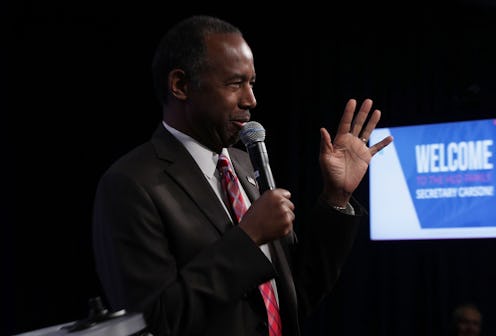
In his first address to employees at the Department of Housing and Urban Development, Dr. Ben Carson referred to African slaves brought the United States as "immigrants," which understandably sparked the ire of countless Americans who saw the comments as racially insensitive. While Carson's initial comments were obviously egregious by themselves, Carson's follow-up comments after calling slaves "immigrants" finally acknowledged his mistake, but one fact remained: Carson's clarification did not erase the fact that he equated slaves with immigrants in the first place.
Carson made his initial comments during a welcome address to employees at the Department of Housing and Urban Development, where Carson has recently been appointed Secretary. The speech focused on America serving as “a land of dreams and opportunity." After describing the experience of immigrants at Ellis Island, Carson began discussing what he mistakenly perceived to be the experiences of slaves who were brought to America.
That’s what America is about, a land of dreams and opportunity ... There were other immigrants who came here in the bottom of slave ships, worked even longer, even harder for less. But they too had a dream that one day their sons, daughters, grandsons, granddaughters, great-grandsons, great-granddaughters, might pursue prosperity and happiness in this land.
According to the Washington Post, while Carson's comments equating slaves with immigrants apparently did not seem to upset many employees present at the address, his words sparked rapid backlash from internet users, who were able to stream the event live online. Many were outraged that Carson would equate voluntary immigration with the experience of slaves who were taken from their homes against their will, endured a treacherous sea crossing, and then were forced to work in a foreign country under horrendous conditions for the duration of their lives.
Carson's attempts to clarify his comments on the Armstrong Williams Show and on Twitter after his address came across as equally misguided. On Williams' radio show, Carson continued to defend the use of the term "immigrants" to describe slaves, saying that there can be "involuntary immigrants" and that immigrants are merely people "who come to live in a foreign country permanently." Furthermore, Carson also came across as pitting the experiences of some enslaved populations against others, saying of slaves who came to the United States, " ... Those people were strong, they were strong-willed, they didn't just give up and die like many of the other people they tried to enslave ... "
Carson finally seemed to acknowledge that it was ill-advised to equate the experiences of immigrants and slaves in a Facebook post he released on his personal page on Monday evening.
The slave narrative and immigrant narrative are two entirely different experiences. Slaves were ripped from their families and their homes and forced against their will after being sold into slavery by slave traders ... The Immigrants made the choice to come to America. They saw this country as a land of opportunity. In contrast, slaves were forced here against their will and lost all their opportunities ... The two experiences should never be intertwined, nor forgotten.
While Carson's Facebook post was much more conciliatory than his earlier comments, many Facebook commenters critiqued Carson for appearing disingenuous with his remarks, considering his earlier defense of his words. Facebook users also asserted that Carson's most recent clarifications do not erase the fact that he equated the slave experience with the immigrant experience in the first place.
Carson's comments equating slaves with immigrants should have never been uttered as part of his speech on achieving the American dream. The positive connotations associated with the word "immigrant" in the United States (in terms of immigrants choosing to move to the country to seek prosperity and success) in no way equates with the slavery endured by millions of Africans forcefully brought to the United States.
Carson should have absolutely realized this initially; but, since he did not, he should have fully acknowledged this false association once it was pointed out to him immediately after his speech. Instead, he defended his use of the word "immigrant," doing very little to assuage the concerns of many who viewed his attitude toward slavery incredibly disconcerting.
Carson's subsequent Facebook post understandably does little to reassure people that he recognizes the misguided nature of his words.